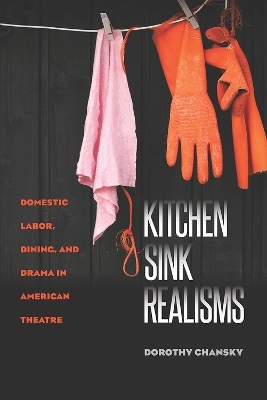
Kitchen Sink Realisms
Domestic Labor, Dining, and Drama in American Theatre
Seiten
2015
University of Iowa Press (Verlag)
978-1-60938-375-6 (ISBN)
University of Iowa Press (Verlag)
978-1-60938-375-6 (ISBN)
From 1918’s Tickless Time through Waiting for Lefty, Death of a Salesman,A Streetcar Named Desire, A Raisin in the Sun, and The Prisoner ofSecond Avenue to 2005’s The Clean House, domestic labor has figuredlargely on American stages. No dramatic genre has done morethan the one often dismissively dubbed “kitchen sink realism”to both support and contest the idea that the home is naturallywomen’s sphere. But there is more to the genre than even its supporterssuggest.
In analyzing kitchen sink realisms, Dorothy Chansky revealsthe ways that food preparation, domestic labor, dining, serving,entertaining, and cleanup saturate the lives of dramatic charactersand situations even when they do not take center stage. Offeringresistant readings that rely on close attention to the particular culturaland semiotic environments in which plays and their audiencesoperated, she sheds compelling light on the changing debatesabout women’s roles and the importance of their household laboracross lines of class and race in the twentieth century.
The story begins just after World War I, as more households wereelectrified and fewer middleclass housewives could afford to hiremaids. In the 1920s, popular mainstream plays staged the plightof women seeking escape from the daily grind; African Americanplaywrights, meanwhile, argued that housework was the least ofwomen’s worries. Plays of the 1930s recognized housework aswork to a greater degree than ever before, while during the waryears domestic labor was predictably recruited to the war effort—sometimes with genderbending results. In the famously quiescentand anxious 1950s, critiques of domestic normalcy became common,and African American maids gained a complexity previouslyreserved for white leading ladies. These critiques proliferated withthe reemergence of feminism as a political movement from the1960s on. After the turn of the century, the problems and comfortsof domestic labor in black and white took center stage. In highlightingthese shifts, Chansky brings the real home.
In analyzing kitchen sink realisms, Dorothy Chansky revealsthe ways that food preparation, domestic labor, dining, serving,entertaining, and cleanup saturate the lives of dramatic charactersand situations even when they do not take center stage. Offeringresistant readings that rely on close attention to the particular culturaland semiotic environments in which plays and their audiencesoperated, she sheds compelling light on the changing debatesabout women’s roles and the importance of their household laboracross lines of class and race in the twentieth century.
The story begins just after World War I, as more households wereelectrified and fewer middleclass housewives could afford to hiremaids. In the 1920s, popular mainstream plays staged the plightof women seeking escape from the daily grind; African Americanplaywrights, meanwhile, argued that housework was the least ofwomen’s worries. Plays of the 1930s recognized housework aswork to a greater degree than ever before, while during the waryears domestic labor was predictably recruited to the war effort—sometimes with genderbending results. In the famously quiescentand anxious 1950s, critiques of domestic normalcy became common,and African American maids gained a complexity previouslyreserved for white leading ladies. These critiques proliferated withthe reemergence of feminism as a political movement from the1960s on. After the turn of the century, the problems and comfortsof domestic labor in black and white took center stage. In highlightingthese shifts, Chansky brings the real home.
Associate professor of theatre and director of the Humanities Center at Texas Tech University, Dorothy Chansky writes about American theatre, audiences, feminist theatre, and translation. She is the author of Composing Ourselves: The Little Theatre Movement and the American Audience and many articles, and coeditor of Food and Theatre on the World Stage. She writes criticism for New York Theatre Wire. She lives in Lubbock, Texas, and New York City.
| Erscheint lt. Verlag | 30.11.2015 |
|---|---|
| Mitarbeit |
Herausgeber (Serie): Heather S. Nathans |
| Zusatzinfo | 14 black & white photographs, 1 illustrations |
| Verlagsort | Iowa |
| Sprache | englisch |
| Maße | 152 x 229 mm |
| Gewicht | 473 g |
| Themenwelt | Kunst / Musik / Theater ► Theater / Ballett |
| Geisteswissenschaften ► Geschichte ► Regional- / Ländergeschichte | |
| Sozialwissenschaften ► Soziologie ► Gender Studies | |
| ISBN-10 | 1-60938-375-3 / 1609383753 |
| ISBN-13 | 978-1-60938-375-6 / 9781609383756 |
| Zustand | Neuware |
| Haben Sie eine Frage zum Produkt? |
Mehr entdecken
aus dem Bereich
aus dem Bereich
Erinnerungen
Buch | Softcover (2024)
Pantheon (Verlag)
16,00 €
Folgen der NS-Zeit und des Zweiten Weltkriegs erkennen und bearbeiten …
Buch | Softcover (2018)
Klett-Cotta (Verlag)
25,00 €


